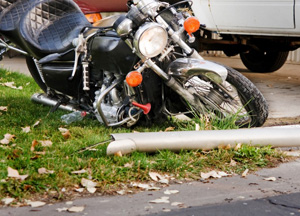Florida Motorcycle Accident Attorney
Helping Injured Motorcyclists Obtain Compensation
Florida is the Sunshine State, and sunshine is a magnet for motorcyclists. Our weather may be perfect for riding, but we hope that motorcyclists will exercise great caution. Despite the fact that motorcycles are a year-round feature on Florida roads, motorcycle accidents are quite common. Motorcyclists are exposed to significant dangers when they ride, and — unfortunately — too many drivers do not understand how to operate their vehicle safely around motorcycles. In some cases, a car or truck driver may simply be unaware of the presence of two-wheelers on the road, as they’re not paying enough attention. Given the risks involved (and the heightened possibility of severe, potentially catastrophic injuries in the event of an accident), it’s important that injured motorcyclists obtain comprehensive representation that can secure adequate compensation. We encourage you to contact Searcy Denney today for assistance — an experienced Florida motorcycle accident attorney at our firm will evaluate your claims and help you understand the steps necessary for obtaining damages.
MOTORCYCLE CRASH VICTIMS CAN TURN TO OUR FLORIDA PERSONAL INJURY LAW FIRM FOR JUSTICE
The injury lawyers at Searcy Denney are no strangers to motorcycle accident cases. In one recent experience, a South Florida husband and wife were riding their Harley Davidson along an oceanfront road when a restaurant delivery truck driver turned directly in front of them. There was no time for the couple to stop or avoid a collision.
The husband was pronounced dead that evening at a local hospital, where his wife was treated for injuries that included large lacerations and fractured bones in both legs. She had surgery and began what was to be long-term physical therapy. The wife retained Searcy Denney personal injury John Shipley, who negotiated a confidential settlement with the restaurant’s insurance company.
FLORIDA MOTORCYCLE LAWS EXPLAINED BY OUR FLORIDA MOTORCYCLE ACCIDENT ATTORNEYS
FLORIDA HELMET LAW
The Insurance Institute for Highway Safety (IIHS) reports that in 2022, a record number of 6,218 people died in motorcycle accidents in the United States. Of those killed, 35% of motorcycle riders and 54% of passengers were not wearing helmets. The issue of helmet laws has become critical to improving motorcycle safety, and the U.S. Department of Transportation has stepped up its efforts to encourage use of helmets that meet federal safety requirements.
- NHTSA studies indicate that Department of Transportation approved helmets are about 37% effective in preventing deaths and about 67% effective in preventing brain injuries among motorcyclists involved in accidents.
- As of March 2025, 17 states and the District of Columbia require that all motorcyclists must wear helmets, and three states – New Hampshire, Illinois and Iowa – have no motorcyclist helmet requirements at all.
- In states that have universal helmet laws, an estimated 91% of motorcyclists were wearing helmets.
- In states that do not have helmet laws, only 24% of motorcyclists in accidents were wearing helmets.
Florida law requires motorcycle drivers and riders to wear federally approved helmets unless they are over 21 years old and are covered by a minimum of $10,000 in medical insurance for motorcycle injuries. Florida also requires motorcyclists to have their headlights on at all times while riding, even during the day.
FLORIDA LANE SPLITTING LAW
Lane splitting involves operating a motorcycle along the divider between two lanes for an extended period of time, with no intention to transition between lanes. In other words, lane splitting involves moving between two adjacent lanes of traffic.
Motorcyclists across the country often lane split during traffic jams to avoid getting stuck behind other vehicles (and to utilize one of the natural “advantages” of the narrow size profile of a motorcycle), but it’s important to note that Florida law prohibits lane splitting. If you are lane splitting, you could be exposed to a significant risk of injury — particularly in Florida, where the practice is illegal, and as such, drivers are not necessarily expecting a two-wheeler to occupy the space between two lanes.
If you suffer an injury due to your lane splitting antics, all is not lost. In Florida, the implementation of “modified” comparative fault liability may give you a right to recover damages in such circumstances, so long as your percentage of fault is less than the defendant’s.
DETERMINING FAULT IN MOTORCYCLE ACCIDENTS
In Florida, motorcyclists who are partially to blame for their own injuries may still be able to collect compensation — but there’s a catch. Their payout can be reduced based on their share of the blame. And if they’re found to be more at fault than the other party, they’re out of luck entirely and can’t recover any damages.
So, what does that really mean?
Let’s say a motorcyclist was speeding when an accident happened. Even though speeding is negligent, they might still have a valid claim for compensation. However, their own fault will come into play. The more responsible they are for causing the crash, the less money they’ll be able to recover — and if they’re over the 50% fault line, they get nothing.
For instance, if the court decides that speeding made the rider 20% responsible for the crash, a total damage award of $500,000 would be reduced by $100,000 — leaving them with a maximum recovery of $400,000.
A FLORIDA MOTORCYCLE ACCIDENT ATTORNEY FROM OUR FIRM CAN HANDLE THE FOLLOWING CLAIMS
Motorcycle accidents can arise in a variety of situations. Depending on the circumstances, you may be entitled to damages as compensation for your losses.
Consider the following:
IMPAIRED DRIVING ACCIDENTS EXPLAINED BY OUR FLORIDA MOTORCYCLE ACCIDENT ATTORNEYS
Impaired driving — whether due to intoxication, fatigue, or some other condition that causes a significant deficit in the ability of a driver to safely operate on the roadway — is a common cause of motorcycle accidents, in Florida and elsewhere. Though motorcyclists are quite used to being “extra” attentive on the road due to the failure of many drivers to adequately account for the presence of two-wheelers, there are some situations where an accident is altogether too unexpected (or impossible) to avoid.
In fact, impaired drivers can be particularly dangerous for motorcyclists, as a driver who is relying more on “muscle memory” and “instinct” (due to their impairment) may not be prepared to navigate around your motorcycle and give you the space necessary to avoid a collision.
If you’ve been injured by an intoxicated driver, then you may be entitled to assume their negligence — negligence per se laws in Florida allow plaintiffs to assume the negligence of any defendant who causes injury due to their violation of a non-traffic penal statute, such as drunk driving laws. This can help your Florida motorcycle accident attorney gain leverage during early settlement negotiations, as the liability of the defendant will be much easier to prove.
HEAD-ON MOTORCYCLE COLLISIONS
Head-on motorcycle collisions are perhaps the most devastating of all types, despite the fact that motorcyclists have time to brace for impact and attempt to avoid the collision. From a physics perspective, a head-on motorcycle collision, both the plaintiff’s and the defendant’s impact forces are combined. Further, the position of the motorcyclist is such (in relation to the force of impact) that there is a high likelihood they will be thrown off the vehicle and into the roadway, causing further injury and exposing them to a potential second or third hit from incoming traffic.
REAR-END ACCIDENTS
Rear-end accidents are extremely dangerous for both two-wheelers and four-wheelers, as the injured plaintiff does not expect the collision and cannot brace themselves for impact. Rear-end accidents in the motorcycle context do not give the rider an opportunity to avoid or prepare for the collision, and as such, the rider may be exposed to a needlessly heightened risk of injury.
It’s worth noting that even low-speed rear-end accidents can cause significant injury for which you can recover under Florida law. For example, if you are stopped at a red light and the defendant-driver rear-ends you, then an existing condition may be exacerbated, such as a deteriorative neck or spinal condition. Exacerbated conditions give you a right of action for damages, so don’t shy away from the potential for litigation — with the help of your Florida motorcycle accident attorney, of course.
HIT AND RUN MOTORCYCLE ACCIDENTS
Hit and run motorcycle accidents are unfortunately common, at least in part because an accident can fully disable a motorcycle, leaving the rider unable to chase down the liable defendant and identify them. By contrast, if the defendant collides with a car, it’s possible that the car will not be totaled and will still be operational (enough to follow the hit-and-run defendant and identify them for the eventual lawsuit).
If a defendant-driver commits a hit-and-run against you, then you’ll have a significant advantage during litigation. We encourage you to contact our firm even if you are not certain who the defendant is — an experienced Florida motorcycle accident lawyer here at Searcy Denney will partner with expert investigators who may be able to locate and identify the defendant.
INTERSECTION ACCIDENTS (T-BONE, BROADSIDE)
T-bones, broadside collisions, sideswipe accidents — any collision affecting the side of a motorcycle is likely to have severe injury consequences for the rider, as there is no material to absorb the impact force of the collision. The full impact force will be felt directly by the rider’s body. In such cases, the damages tend to be astronomical to account for the catastrophic degree of loss.
LEFT TURN COLLISIONS
Among the most common motorcycle accidents is the left turn collision occurring at an intersection. Oftentimes, this sort of accident happens due to the failure of a driver to observe the “see” the motorcycle making a left turn — as such, the driver may turn in front of the motorcyclist and cut them off, causing a collision.
Florida law gives right-of-way to vehicles based on their approach to an intersection. For example, in Florida, a driver must yield right-of-way to a motorcycle (or any other vehicle) making a left turn at an intersection.
LIMITED VISIBILITY MOTORCYCLE ACCIDENTS
Motorcycles have a small size profile, making them fun to ride — and highly maneuverable in many cases — but also making them difficult to spot in certain conditions. For example, if a driver is speeding through foggy weather, there’s a better chance that they’ll spot a full-size car or truck than a motorcycle, unless they’re cognizant of the possibility of there being a motorcycle.
Motorcyclists often try to circumvent this visibility issue by honking more frequently to alert drivers of their presence, or by driving in a pattern so that they create a more obvious visual signature for others.
MOTORCYCLE MANEUVERABILITY ACCIDENTS
Many drivers lack firsthand experience with motorcycles, and are therefore lacking an understanding of the limitations and maneuverability issues that face motorcyclists on Florida roadways.
In the maneuverability sense, there are a few things that drivers should be aware of so that they can avoid a collision:
- Motorcycles do not come to a stop faster than cars (despite the fact that they are lighter vehicles).
- Motorcycles may move a lot “within the lane” to avoid potholes, debris, slick conditions, and further, to signal to other drivers that they are occupying the lane.
- Motorcycles need space to maneuver and alter their course — drivers should keep the same distance behind a motorcycle as they would a car or a truck.
- Turn signals may not be clicked off at precise times, so driver should be careful to assume an intent to make a turn.
- And more
If drivers understood the challenges involved in operating a motorcycle, there would almost certainly be fewer accidents.
RIGHT-OF-WAY VIOLATIONS
In Florida, right-of-way is not assigned based on whether a vehicle is a two-wheeler or a four-wheeler. Traffic lights are — as everyone is well aware — applicable regardless of the vehicle type. Right-of-way rules are therefore governed by various circumstantial factors, such as signage and intersection approach order.
When approaching an intersection, for example, the defendant must yield right-of-way to your motorcycle if you: 1) reached the intersection before they did; 2) are making a left turn; and 3) are approaching the intersection from an attached secondary road.
UNSAFE LANE CHANGING ACCIDENTS
Lane changing accidents are very common in the motorcycle accident context, and for good reason. Drivers may change lanes recklessly, without taking the time to properly assess their mirrors for the presence of a motorcycle (or other two-wheeler). This can quite easily lead to an accident, and — depending on the circumstances — you may not have the time necessary to avoid the collision.
SERIOUS INJURIES CAUSED BY MOTORCYCLE ACCIDENTS
Motorcycle accidents expose riders to a risk of severe — even catastrophic — injury due to their structure. Motorcycles are light and lack full rider coverage in the same way that a driver using a car has. For example, if a vehicle collides with you from the side, the impact force will be directly imposed on your body.
In Florida motorcyclists are required to wear a helmet. However, that doesn’t mean riders always do. We’ve seen our fair share of traffic biking accidents and we can say that wearing a helmet is always a good idea to avoid injuries like:
-
Skull fracture
-
Intracranial hemorrhage (brain bleeding)
-
Concussion
-
Facial fractures (jaw, nose, cheekbones, etc.)
-
Eye injuries or vision loss
-
Dental injuries (broken or lost teeth)
-
Neck fractures
-
Severe road rash to the head/face
-
Hearing loss
-
Loss of consciousness
-
Cognitive impairment
-
Permanent disfigurement
-
Chronic migraines or pain
-
Death
It’s an unfortunate truth that the injuries and damages sustained from motorcycle accidents is often catastrophic. Our attorneys fight for your right to receive compensation after a traumatic accident, which may include monies for medical bills (including future medical costs), pain and suffering, lost wages (and loss of earning capacity), and more. It’s part of our role as your personal injury lawyer to ensure you’re receiving maximum compensation.
SEARCY DENNEY MOTORCYCLE ACCIDENT ATTORNEY VERDICTS AND SETTLEMENTS
- Judgment of $10 Million Against Big Trucking Company for Motorcyclist’s Injuries
- $6.2 Million award for horrific injuries caused by motorcycle crash
- Groom’s Death in Motorcycle Crash Brings Confidential Settlement for Injured Bride
- Motorcycle crash permanently injures professional marine captain
Read about more motorcycle accident case results and verdicts.
WHAT YOU NEED TO DO TO PROTECT YOUR LEGAL RIGHTS
If you have a claim after a motorcycle accident in Florida, it is up to you to protect your legal rights. You need to take action, and you need to make sure you are relying on advice from someone who has your best interests (not the insurance companies’ best interests) in mind.
So, what should you do? Most importantly, you should seek help right away. You should see a doctor for treatment, and you should follow your doctor’s advice throughout your recovery. Make sure you understand your diagnosis, fill your prescriptions and do everything you can to maximize your chances of making a full recovery.
Seeking help also means talking to an attorney about your legal rights. If you were seriously injured in your motorcycle accident, you do not want to try to deal with the insurance companies on your own. You have too much at stake, and you could easily end up with far less than you deserve. An experienced motorcycle accident attorney will be able to deal with the insurance companies for you and help you make a smart decision about when (and if) to accept a settlement.
OUR ATTORNEYS’ FEES IN MOTORCYCLE ACCIDENT CASES
Our attorneys handle all motorcycle accident cases on a contingency-fee basis. This means that you owe us nothing unless we help you secure a financial recovery. Hiring an attorney at Searcy Denney costs nothing out of pocket, so you have no reason not to seek experienced legal representation.
WHEN YOU NEED A FLORIDA MOTORCYCLE ACCIDENT ATTORNEY, WE’RE HERE. CONTACT US TODAY!
No one expects accidents to happen, but they do. If a family member has been killed or injured or you have been involved in a motorcycle accident, Searcy Denney’s experienced personal injury attorneys and support teams stand ready to help you.
Please take the time to complete our Contact Form, or call us directly at 1-855-899-9246 for a free, confidential consultation with a top Florida motorcycle accident attorney. Our offices are located in Tampa, West Palm, and Tallahassee.





